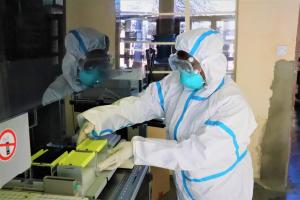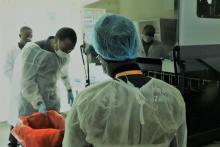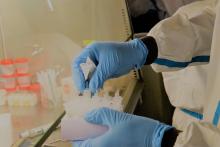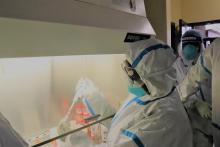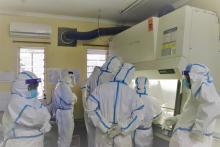Enhancing capacity for laboratory diagnosis for COVID-19 at Beitbridge District Hospital
Beitbridge, Zimbabwe - When WHO, National Microbiology Reference Laboratory (NMRL) and Medsure Healthcare teams reached Beitbridge, 640km from Harare, twelve laboratory personnel from Beitbridge Hospital had already tested more than 6000 samples for COVID-19. The tests were done using a GeneXpert machine with cartridges for COVID-19 testing and Real Time- Polymerase chain reaction (PCR) tests, similar to the rapid testing kit used for HIV. GeneXpert machines are normally used to diagnose tuberculosis.
“The Abbott Platform tests 94 samples at a time. Together with our three GeneXpert machines which run four tests on each machine at once and the PCR, I am 100% confident we will be able to test more samples a day. We have already run 500 PCR tests before with our average daily testing at 200. We are definitely going to double this up to 400 a day,” says Patience Magaya, laboratory technician at Beitbridge District Hospital.
Beitbridge laboratory personnel recently received the Abbott platform, and had never used it before. They had no knowledge of how the Abbott Platform operates unlike other hospitals. To close the knowledge gap, the NMRL and Medsure Healthcare with support from WHO, conducted a five-day on the job training for the laboratory personnel on how to use the Abbott Platform to test for COVID-19.
Twelve laboratory personnel were trained between 20 and 24 July, 2020. “The main objective of this training was to access Beitbridge’s laboratory for biosafety, waste management and most importantly to ensure the laboratory staff can use the Abbott platform to test for COVID-19,” explained Tapfumaneyi Mashe, one of the training facilitators from NMRL.
“As Beitbridge hospital, this was our first time using the Abbott platform. The five-day training, I received from NMRL and WHO has provided me with the knowledge and skills l need to use this new platform. We were taken through all the steps we need to follow to operate the machine. And also received a practical lesson testing the samples we collected from the Quarantine Centre,” says Lucy Mwavhera, district laboratory scientist.
NMRL went a step further and invited Medsure Health care technicians, the machine suppliers, to conduct an orientation of how the Abbott Platform works. Together as a team, NMRL, Medsure and WHO provided on the job training. Assisted the laboratory personnel with collecting samples from Beitbridge Quarantine Centre. The samples collected were then run on the Abbott platform. During the five-day training the Abbott platform was run four times to ensure the laboratory personnel could use the machine to test for COVID-19.
“Beitbridge is overwhelmed with testing for COVID-19 due to our proximity to the border. We test for COVID-19 everyday as buses with returnees continue to bring people. The Abbott platform will allow us to scale up our testing capacity as this machine can test 94 samples at a time. It is unlike the GenXpert machines, which we have been using and can only test four samples at a time,” added Otilia Gasva, Microscoptist from Beitbridge Hospital laboratory.
To further strengthen Beitbridge laboratory personnel’s capacity to reach the national target of conducting 1000 tests per day, the Ministry of Health and Child Care (MoHCC) gave Beitbridge Hospital the Abbott Platform to use for testing COVID-19.
The existing Abbott platforms in Zimbabwe have always been used for HIV viral load testing. After, the MoHCC approval to use the existing Abbott platform for Covid-19 testing. MoHCC procured specific SARS-CoV-2 (Covid-19) reagents with support from various partners such as Clinton Health Assess Initiative (CHAI), Global Fund and World Bank. These reagents will allow the Abbott platform to test for Covid-19.
The Abbott platform training is part of Zimbabwe’s efforts to expand the country’s capacity to test. “Although as a country we have not managed to hit our 33000 test a month target. We hope that with the introduction of high throughput machines like Abbott platform in provincial laboratories will get us closer to the goal. As it will allow them to test 96 samples at a time. This will complement their other existing testing platforms, in other testing National laboratories” added Dr Mugabe Muchaneta, WHO’s laboratory specialist.
Gwanda, Bulawayo, St Lukes Lupane and Chitungwiza will also be using the Abbott Platform to test for COVID-19. This is part of Zimbabwe’s Laboratory COVID-19 testing strategy whose main goal is to scale up testing using a tier- based approach. Laboratories in Zimbabwe will be using a combination of Genexpert machines and RT-PCR machines such as Abbott platform, Quantstudio 3, ABI7500 to test for COVID-19. Generous funding support from USAID through WHO is contributing to enhancing laboratory diagnosis for COVID-19 in Zimbabwe. Testing for COVID-19 remains important in timely detection, isolation and contact tracing to reduce and contain the rapid spread of the virus in Zimbabwe.



